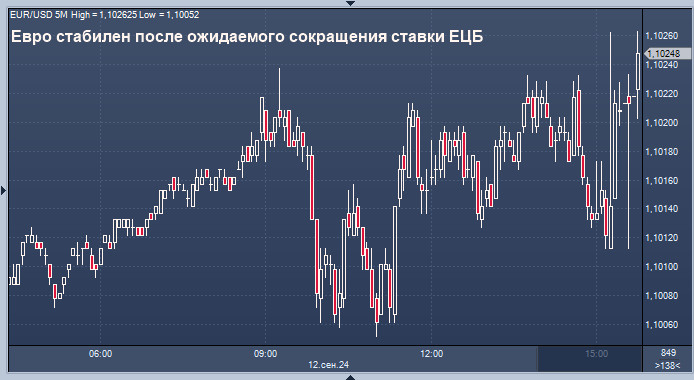

By the end of this week, the euro has regained confidence and managed to recoup some of its earlier losses. While the euro has once again found bullish momentum and showed an uptrend, it has not managed to dethrone the US dollar.
Nevertheless, the euro has recouped earlier losses and is aiming for new heights. The euro's rise was aided by the ECB's decision to cut interest rates by a quarter of a percentage point in response to declining inflation in the eurozone and growing concerns about a possible economic slowdown in the reurozone. On Thursday, September 12, the ECB cut the key interest rate by 60 basis points, down to 3.65%. Analysts noted that this is the second rate cut in the past three months, following the first reduction by 25 basis points in June, the first since 2019. The deposit rate was also lowered by 25 basis points to 3.5%, and the marginal lending rate was slashed by 60 basis points to 3.9%.
Thursday's decision to reduce the ECB's base deposit rate came amid expectations that the Federal Reserve would begin lowering borrowing costs next week. Time will tell how accurate these expectations are. The ECB's rate cuts have been closely linked to inflation in the eurozone, which slowed to a three-year low of 2.2% in August. In July, this figure stood at 2.6%. A drop in industrial output in Germany and Italy has raised concerns about a potential slowdown in the eurozone economy after a brief period of growth recorded in early 2024.
Domestic inflation in eurozone countries remains high as wages continue to rise at an accelerated pace. However, pressure on labor costs is easing, and profits are partially offsetting the impact of higher wages on inflation, according to the ECB. The central bank's latest report included both hawkish and dovish remarks. On one hand, the ECB stated that financing conditions remain restrictive and economic activity is low. On the other hand, changes were noted, as policymakers revised their inflation forecasts upward. Many experts defined this approach as hawkish.
Current macroeconomic data on inflation in the EU aligns with expectations and confirms previous ECB forecasts. It is expected that average inflation in the eurozone will be 2.5% in 2024, 2.2% in 2025, and 1.9% in 2026. The ECB's Governing Council is committed to ensuring inflation returns to the target of 2% in a timely manner. To achieve this, the ECB plans to keep rates "sufficiently restrictive" for as long as needed.
Against this backdrop, the EUR/USD pair exhibited mixed dynamics, sometimes stalling and then slightly retreating. Following the ECB's rate decision, the pair's momentum shifted upward. As a result, the euro made notable gains, slightly pushing back the dollar. On Friday, September 13, the EUR/USD pair was trading around 1.1082, having regained a significant portion of its losses and aiming for new peaks. The single currency has since strived to maintain the stability it gained after the ECB's decision.

In its updated quarterly forecasts, the ECB expects the region's economy to grow by 0.8% in 2024, slightly below the June estimate of 0.9%, experts highlight. Furthermore, the ECB also revised its 2025 GDP growth forecast down to 1.3% from 1.4%. The reason, according to ECB representatives, is "weaker domestic demand in the coming quarters." The central bank also maintained its inflation forecast for this year at 2.5%, and for next year at 2.2%.
According to Christine Lagarde, the ECB president, there is a "mixed picture on inflation" in the eurozone, which continues to be driven by rising wages, despite easing pressure on labor costs. "Importantly, the ECB's track record for predicting inflation growth is limited. Therefore, the regulator wants to be certain about the accuracy of its decisions before proceeding with more aggressive rate cuts," analysts at ING assert.
Currently, the recovery of the European economy faces unfavorable factors. In this context, easing monetary policy restrictions should support the economy, Lagarde believes. According to the ECB president, the key upward risks for inflation are wages, profits, and trade tensions. September inflation data will likely be low, but inflation could rise again in the fourth quarter of 2024, the ECB forecasts.
In the current situation, currency strategists at Morgan Stanley expect quarterly deposit rate cuts of 25 basis points through the end of 2025. If this scenario plays out, the rate will drop to 2.25% by the end of next year, experts note. This scenario could weaken the euro and strengthen the dollar, Morgan Stanley adds. Continued pressure on the EUR/USD pair could threaten the euro's dynamics, potentially bringing it to parity with the dollar.

RÁPIDOS ENLACES